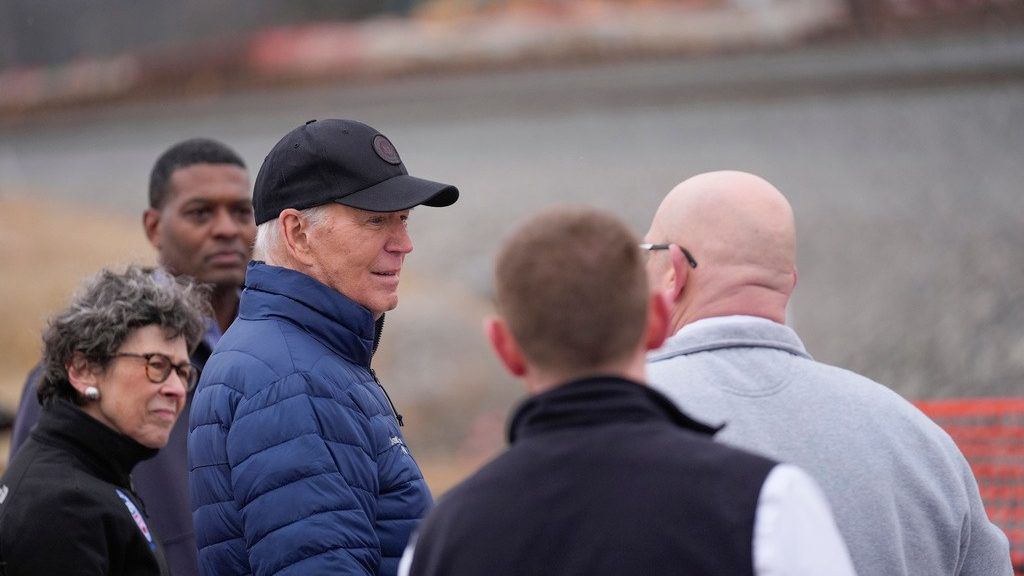Ohio’s Republican Gov. Mike DeWine said Thursday that he is calling a rare special session of the General Assembly next week to pass legislation ensuring that President Joe Biden is on the state’s 2024 ballot.
The special session was called for Tuesday.
“Ohio is running out of time to get Joe Biden, the sitting President of the United States, on the ballot this fall. Failing to do so is simply unacceptable.This is ridiculous. This is (an) absurd situation,” DeWine said.
As it stands, Biden and Vice President Kamala Harris may not be on the ballot in Ohio in November due to a timing conflict between the Democratic National Convention and a state deadline, a top election official in the state warned this week as the Ohio legislature ended its May session on Wednesday without resolving the procedural issue.
Ohio’s deadline to get on the ballot for November is Aug. 7. The Democratic National Convention, when Biden and Harris will be officially nominated by their party, is scheduled for Aug. 19-22 in Chicago.
Since Ohio changed its certification deadline from 60 to 90 days ahead of the general election, state lawmakers have had to adjust the requirement twice, in 2012 and 2020, to accommodate candidates of both parties. Each change was only temporary.
Lawmakers were unable to come up with a fix by the May 9 cutoff set by Ohio Secretary of State Frank LaRose.
“With a legislative remedy taken off the table, I must remind you that the deadline is fast approaching, and the matter remains unresolved,” wrote LaRose, a Republican who unsuccessfully ran for U.S. Senate earlier this year, in a letter to Ohio Democratic Party chair Liz Walters. “Unless your party plans to comply with the statutory deadline, I am duty-bound to instruct boards of elections to begin preparing ballots that do not include the Democratic Party’s nominees for president and vice president of the United States.”
DeWine said he spoke to LaRose on Thursday and he said we’re “up against a wall.” LaRose told him next Wednesday is the drop-dead deadline.
“I’ve waited. I’ve been patient. And my patience has run out,” DeWine said.
DeWine said his proclamation will allow for passing a Senate version of the bill that also bans foreign nationals from contributing to Ohio ballot measures.
The proposal has been described as a “poison pill” in the fractured Ohio House, where Republicans rely on Democratic votes for pass some legislation.
The Biden campaign did not immediately respond to a request for comment on Thursday, but a spokesperson expressed confidence that “Biden will be on the ballot in all 50 states” earlier in the day.
“We are assessing next steps accordingly,” spokesperson Charles Lutvak said in a statement. “Election after election, states across the country have acted in line with the bipartisan consensus and taken the necessary steps to ensure the presidential nominees from both parties will be on the ballot.”
The campaign had hoped for a legislative solution, but was looking at possibly pursuing litigation or tweaking the Democratic Party’s nominating process prior to DeWeine's announcement, a source familiar with internal deliberations told Spectrum News.
Lutvak pointed to Alabama, a deep-red state, and Washington, whose legislature is controlled by Democrats, as states who had similar ballot issues and who have taken steps to ensure Biden will be an option for voters in November. Alabama’s House of Representatives voted 93-0 to change their deadline to benefit Biden and Republican Gov. Kay Ivey, no friend to Biden, signed the bill into law the same day earlier this month.
While Ohio is not the swing state it once was -- the last Democrat to win the state was President Barack Obama in 2012 -- Biden and Harris falling off the ballot there could hurt down ballot races, including that of Sen. Sherrod Brown. Brown is Ohio’s last remaining statewide elected Democrat and a progressive whose reelection would be key to Democrats’ hopes of clinging to their slim, imperiled majority in the Senate
One expert told Spectrum News last month that upwards of $100 million could be poured into that Senate race. But if Biden isn’t on the top of the ballot, there are concerns that some Democrats could stay home.
“There's no sugar-coating this: I'm facing the toughest race of my life,” Brown wrote in a fundraising email on Wednesday.
Brown’s campaign did not immediately return a request for comment on Thursday.
The last time Ohio lawmakers were ordered back to Columbus in a such a manner was in 2004, under Republican Gov. Bob Taft, to consider campaign finance reform









